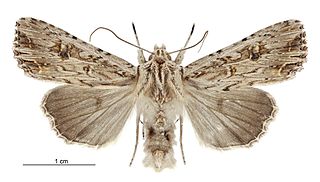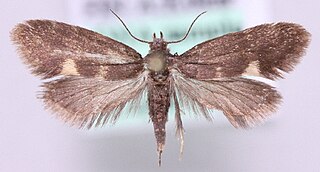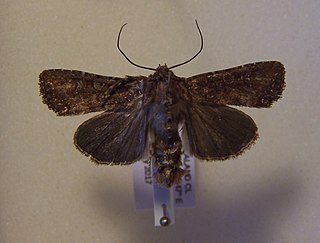
The Hydropsychidae are a family-level taxon consisting of net-spinning caddisflies. Hydropsychids are common among much of the world's streams, and a few species occupy the shorelines of freshwater lakes. Larvae of the hydropsychids construct nets at the open ends of their dwellings which are responsible for their "net-spinning caddisfly" common name.

Ichneutica is a genus of cutworm or dart moths in the family Noctuidae. The genus is found in New Zealand and surrounding islands. There are more than 80 described species in Ichneutica, the largest known genus of Lepidoptera in New Zealand. In 2019 this genus was revised and greatly expanded with the genera Graphania Hampson, 1905, Tmetolophota Hampson, 1905 and Dipaustica Meyrick, 1912 all subsumed within it.

Ichneutica lignana is a moth of the family Noctuidae. It is endemic to New Zealand. This species is found on the Three Kings Islands as well as the North, South and Stewart Islands. This species lives in a variety of habitats including coastal areas, tussock grasslands, shrublands, and native forest, at a range of altitudes from sea level to over 1300 m. I. lignana is quite distinctive in appearance with its dark markings on the abdomen and forewings although it is possible to confuse Ichneutica morosa, Meterana pansicolor and Meterana pascoi with this species. Adults are on the wing throughout the year in the northern parts of the New Zealand but are restricted to the months of October to April in the more southern parts of the country.

Tambja morosa, also known as Tambja kushimotoensis or gloomy nudibranch, is a species of sea slug, a dorid nudibranch, a shell-less marine gastropod mollusk in the subfamily Nembrothinae within the family Polyceridae.

Lampronia morosa is a moth of the family Prodoxidae. It is found in most of Europe, except Ireland, Latvia, Lithuania, Portugal and part of the Balkan Peninsula. It is also present in the Caucasus and Asia Minor.

Neptis morosa, the savanna sailer or morose sailer, is a butterfly in the family Nymphalidae. It is found in Senegal, Guinea, Sierra Leone, Ivory Coast, Ghana, Togo, Benin, Nigeria, Cameroon, Gabon, the Republic of the Congo, the Central African Republic, Angola, the eastern part of the Democratic Republic of the Congo, Uganda, Burundi, western Kenya and north-western Tanzania. The habitat consists of moist areas and forest margins.
Iconostigma morosa is a species of moth of the family Tortricidae. It is found in New Caledonia in the southwest Pacific Ocean.

Deinypena morosa is a moth of the family Noctuidae. It is found in the Democratic Republic of Congo.

Ichneutica morosa is a moth of the family Noctuidae. It is endemic to New Zealand and is found in the southern parts of the North Island and throughout the South Island. I. morosa is common in the eastern parts of both those islands and also in Fiordland. I. morosa can be found from altitudes ranging from lowlands to the alpine zone. I. morosa is absent from the range of its closely related species I. mustulenta, that is from the northern North Island. The larvae of I. morosa are known to feed on Poa astonii and also on other Poa species including introduced species. As well as its standard form the adult moths have a grey colour morph with the head and thorax being a grey and mottled brown, and the forewing being a pale greyish ochreous to a deep brown, suffused with grey. I. morosa can be confused with I. mustulenta and I. lignana. Adults are on the wing from November to April.
Capua morosa is a species of moth of the family Tortricidae. It is found on Java in Indonesia.
Mesocalyptis morosa is a species of moth of the family Tortricidae. It is found on New Guinea.

Euploea morosa is a butterfly in the family Nymphalidae. It was described by Arthur Gardiner Butler in 1866. It is found in the Australasian realm.
Aphorista is a genus of handsome fungus beetles in the family Endomychidae. There are at least four described species in Aphorista.

Chorisoneura is a genus of cockroach in the family Ectobiidae. There are at least 90 described species in Chorisoneura.
Aphorista vittata is a species of handsome fungus beetle in the family Endomychidae. It is found in North America and Southern Asia.
Aphorista laeta is a species of handsome fungus beetle in the family Endomychidae. It is found in North America.
Erynephala morosa is a species of skeletonizing leaf beetle in the family Chrysomelidae. It is found in North America.

Erynephala is a genus of skeletonizing leaf beetles in the family Chrysomelidae. There are six described species in Erynephala. They are found in North America and the Neotropics.

Ichneutica mustulenta is a moth of the family Noctuidae. This species is endemic to New Zealand is widespread throughout the North, South and Stewart Islands. I. mustulenta prefers damp native forest in the west of the North and South Islands. Its range only overlaps with its close relative I. morosa in a few places such as Taranaki. The life history of this species is unknown as are the host species of its larvae. However it is assumed that the larval hosts of this species will be grasses similar to its close relatives in the same genus. Adults of this species are on the wing from January to March.

Tingena morosa is a species of moth in the family Oecophoridae. It is endemic to New Zealand and has been found in the South Island in Nelson including at the Dun Mountain and in the Canterbury region. This species inhabits native forest at altitudes from 2000 to 3000 ft. Adults of this species are on the wing in December.













